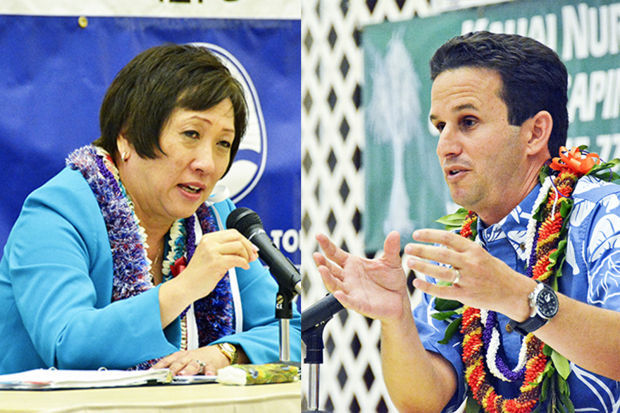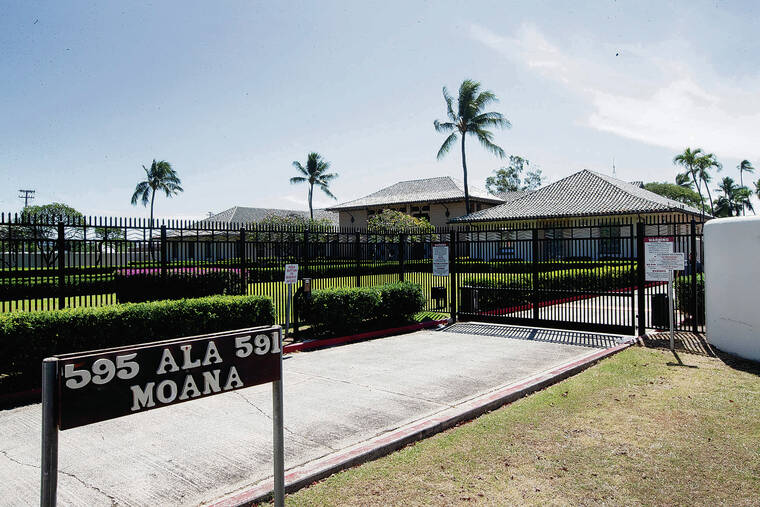LIHUE — Two Democrats walked into the Lihue Convention Hall on Tuesday and made their way to the front of the room, where a table on an elevated stage waited for them.
Each lei-draped candidate, vying for the U.S. Senate spot on the party’s ticket in the primary election, took their place at the table as nearly 200 people sat before them — many of whom wore white T-shirts emblazoned with their names.
The eyes of many more watched from live video broadcasts at the back of the brightly lighted room.
By all accounts, both candidates, Senate Incumbent Brian Schatz and U.S. Rep. Colleen Hanabusa, came from humble family backgrounds and had distinguished track records in state and federal offices — accomplishments that either contender could attest to.
But the difference between them, Hanabusa contended, “is in our values and our perspectives, and our perspectives are shaped by a lifetime of experience and hard work.”
For nearly an hour and a half, Hanabusa and Schatz fielded questions, and exchanged a few verbal buffets, on a number of issues at a Kauai Chamber of Commerce forum, ranging from the Hawaii Superferry, a now defunct inter-island ocean transportation service, to regulations on genetically modified organisms.
“Hawaii is the best place in the world to live, but it’s not that easy to make it,” Schatz said. “It’s hard to enter the middle class, for people who aren’t quite there yet, and for those of us who are in the middle class, it’s hard for us to stay in the middle class. It’s also hard to stay in Hawaii and keep your family together.”
Military and Veterans
Both candidates, at the beginning of the forum, found common ground by recognizing the Pacific Missile Range Facility as a key training and research station in the Asia-Pacific region — one that has become increasingly important as threats from North Korea arise.
Where they differed, however, was their stance on President Barack Obama’s recent strategy to send non-military advisors and several hundred U.S. troops to Iraq as violent attacks escalate.
Schatz said he thinks “there is no military solution in Iraq.”
“We have learned that lesson,” he said. “We’re not going to commit blood or treasure to that sectarian conflict. This is now up to the Iraqis. If there’s one thing we learned over the past 12 years, you don’t go in because you feel that it’s urgent but you have no plan. It’s even worse than before in the following sense.”
Even so, Schatz said, there is still a need to protect the United States embassy there.
“If there’s anything that the Benghazi tragedy taught us, it’s that we need to harden embassy security, especially in a situation that is emerging and is dangerous,” Schatz said.
Hanabusa disagreed and said military forces should not be sent into Iraq to solve an internal civil war.
“Let us not make the same mistake,” Hanabusa said. “Let us know that we need a reason why we’re there, an endgame, a strategy to withdraw. None of that is being said. It’s unfortunate. We cannot get involved in Iraq.”
Both candidates, meanwhile, agreed that one way to cure a systemic problem within the U.S. Department of Veterans Affairs — in which veterans must wait months at a time to seek medical help — is providing them with the immediate care they need by appropriating more funds and hiring more doctors and nurses.
“We are at a critical time,” Hanabusa said. “We have an increase in the number of veterans who can avail themselves of the service, which they should — they should be able to. All the vets have the right to do this — we have to find a way to be able to service them.”
Schatz called the recent scandal “a moral failure,” and said the solutions recently made in Congress reached across political parties.
They disagreed on one specific stance: the expansion of a naval hospital on Guam as a key piece of the solution.
“I don’t think we should be investing in facilities on Guam that are going to take time, money and resources away from the state of Hawaii,” Schatz said. “We should be investing in capacity at veterans centers on Kauai and across the state of Hawaii, not throughout the Asia-Pacific region.”
Hanabusa didn’t see it that way.
She said the hospital is being expanded to accommodate a growing number veterans from neighboring areas who could use the medical services.
“I don’t think Brian understands what Guam is all about,” Hanabusa said.
Genetically modified organisms
Schatz and Hanabusa also took opposing positions on the federal government’s role in regulating genetically modified organisms, commonly known as GMOs.
There are certain regulations in place, namely the Organic Foods Production Act, that address genetically modified organisms, Hanabusa said.
The difficult part, however, is setting GMO percentage thresholds for non-GMO products, she said.
“The federal government needs to continue to make that decision and science needs to step up to the plate,” Hanabusa said. “We all need step back, and I believe, have that discussion and understand what’s going on.”
Schatz, on the other hand, said, “The federal government doesn’t have any business interfering with what individual communities decide what’s best for them when it comes to this issue.”
“Nothing is more personal for a lot of people than what you put on your table or what you put in your kids’ bodies,” Schatz said. “I understand the passions that this issue has certainly aroused, not only on this island, but across the state of Hawaii. People feel very, very strongly about this.”
The Hawaii Superferry
When Schatz was asked what his position was on the return of the Superferry to Hawaii, it drew an audible, “Ohoo,” from the audience.
“Not on Kauai,” Schatz abruptly quipped with a laugh.
There were, he said, “so many problems with the Superferry.”
A key mistake made by Superferry and state officials, he said, was not surveying individual communities to gauge the level of interest in the project.
“That’s not just common sense if you want to get a project done,” Schatz said. “It’s also only fair.”
Though there have been proposals raised to bring the Superferry back to Hawaii, Schatz said he doesn’t believe it’s worth pursuing.
“I don’t think it’s a good use of all of our time,” Schatz said. “I believe it would, again, divide our community. I think the Superferry is an idea that was tried, that died, and we should probably leave it alone.”
Hanabusa, however, had another idea.
Since the two Superferry vessels are now owned by the U.S. Navy, Hanabusa said she believes “there is a military use for one of the Superferries.”
Although the vessel would not be used for the general public, the military’s use of the Superferry vessel in Hawaii could be beneficial when natural disasters strike the islands.
“In the case of natural disasters, we need other modes of transportation, and nothing would serve us, I think, as well as that vessel, but it would be for a military purpose,” Hanabusa said. “It would be able to hold heavy equipment, if we ever need it, and I think that’s an alternative that we can also rely on.”





